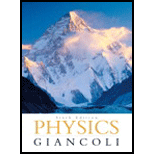
Concept explainers
Can a particle ever move from a region of low electric potential to one of high potential and yet have its electric potential energy decrease?
Answer to Problem 5Q
Solution:
A particle can move from a region of low electric potential to one of high potential and yet have its electric potential energy decrease
Explanation of Solution
We have potential difference between two points, , where is the potential energy and q is the charge.
Now consider a negative charge is released, it will move towards positive plate. Because of the acceleration of the charge its kinetic energy increases. When kinetic energy increases potential energy decreases. i.e. and , so potential difference between 2 points is positive. Which means negative charge moves to a region of higher potential. So, a particle can move from a region of low electric potential to one of high potential and yet have its electric potential energy decrease.
Chapter 17 Solutions
Physics: Principles with Applications
Additional Science Textbook Solutions
Conceptual Integrated Science
The Cosmic Perspective
Lecture- Tutorials for Introductory Astronomy
College Physics
University Physics Volume 1
Life in the Universe (4th Edition)
 College PhysicsPhysicsISBN:9781305952300Author:Raymond A. Serway, Chris VuillePublisher:Cengage Learning
College PhysicsPhysicsISBN:9781305952300Author:Raymond A. Serway, Chris VuillePublisher:Cengage Learning University Physics (14th Edition)PhysicsISBN:9780133969290Author:Hugh D. Young, Roger A. FreedmanPublisher:PEARSON
University Physics (14th Edition)PhysicsISBN:9780133969290Author:Hugh D. Young, Roger A. FreedmanPublisher:PEARSON Introduction To Quantum MechanicsPhysicsISBN:9781107189638Author:Griffiths, David J., Schroeter, Darrell F.Publisher:Cambridge University Press
Introduction To Quantum MechanicsPhysicsISBN:9781107189638Author:Griffiths, David J., Schroeter, Darrell F.Publisher:Cambridge University Press Physics for Scientists and EngineersPhysicsISBN:9781337553278Author:Raymond A. Serway, John W. JewettPublisher:Cengage Learning
Physics for Scientists and EngineersPhysicsISBN:9781337553278Author:Raymond A. Serway, John W. JewettPublisher:Cengage Learning Lecture- Tutorials for Introductory AstronomyPhysicsISBN:9780321820464Author:Edward E. Prather, Tim P. Slater, Jeff P. Adams, Gina BrissendenPublisher:Addison-Wesley
Lecture- Tutorials for Introductory AstronomyPhysicsISBN:9780321820464Author:Edward E. Prather, Tim P. Slater, Jeff P. Adams, Gina BrissendenPublisher:Addison-Wesley College Physics: A Strategic Approach (4th Editio...PhysicsISBN:9780134609034Author:Randall D. Knight (Professor Emeritus), Brian Jones, Stuart FieldPublisher:PEARSON
College Physics: A Strategic Approach (4th Editio...PhysicsISBN:9780134609034Author:Randall D. Knight (Professor Emeritus), Brian Jones, Stuart FieldPublisher:PEARSON





